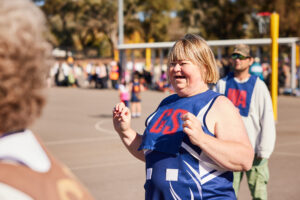Five traits Lifely looks for in Community Facilitators
Did you know the disability support sector is growing all the time? By 2025, the total value of the National Disability Insurance Scheme is expected to reach $30 billion!
NDIS support workers are the glue that keeps the NDIS together. Without them, people living with a disability wouldn’t get the personalised day-to-day care they need to lead a better life.
Currently, there are not enough workers to meet the demand. In fact, across Australia, the disability sector needs an estimated 120,000 to 150,000 more workers.
For people looking for a career in the disability sector, the worker shortage provides a fantastic opportunity for a rewarding job with opportunities to grow and advance your career.
So, how do you get started as a support worker, or as we like to call them, a Community Facilitator?
What is a Community Facilitator?
At Lifely, we believe our frontline workers do more than just care for people living with a disability.
Each of our workers is a vital link between the participants they support and their communities, whether that is the place they live or the groups they belong to. That’s why instead of using the title Support Worker, we use Community Facilitator.
Our Community Facilitators help participants with everyday tasks, such as:
- Personal care
- Meal preparation
- Help with money and budgets
- Getting out and about
- Shopping
- Doctors’ visits and appointments
- Social outings and sport
- Holidays and travel
- General emotional and social support
- Transport
But, one of their most critical jobs is supporting participants to work on their NDIS goals. NDIS goals are unique to the participant’s life; they can be simple, complex, or long-term. As such, Community Facilitators play a pivotal role in the lives of people living with a disability.
Our Community Facilitators offer highly personalised assistance to people living with a disability. They regularly go to the homes of NDIS participants to help them with everyday tasks.
Community Facilitators must possess specific personal and professional skills to excel at their work.
Let’s take a look at the top five traits necessary to become an NDIS Community Facilitator.
1. Vocational or Tertiary Qualifications
It is possible to become an NDIS Community Facilitator without formal qualifications. However, a TAFE or university qualification is a highly desirable asset.
Having formal qualifications in disability support work helps candidates set themselves apart from other applicants in a fiercely competitive job market.
Here are some of the qualifications our workers regularly possess:
- Certificate III in Early Childhood Education and Care
- Certificate III in Health Services Assistance
- Certificate III in Individual Support (Aging, Home and Community)
- Certificate IV in Allied Health Assistance
- Certificate IV In Disability
- Certificate IV in Leisure and Health
These qualifications share that they help equip graduates with the industry knowledge and practical experience needed to do well in the sector.
With a mix of theory, coursework and practical experiences, graduates are well placed to make a significant impact on the lives of the people they work with right from the get-go.
We also have many workers who have or are working towards undergraduate and postgraduate university degrees in topics as varied as:
- Alcohol and Other Drugs
- Community Health
- Criminology and Criminal Justice
- Disability Practice
- Education
- Family therapy
- Health Science
- Occupational Therapy
- Physiotherapy
- Psychology
- Public Health
- Rehabilitation
- Social Work
- Speech Pathology
And many more.
A degree can help you stand apart from the crowd of candidates when applying for a job. It also allows you to transition into roles with added responsibility later in your career.
Community Facilitators must also have a first-aid certificate and full Australian Driver’s Licence.
2. Practical Experience
Many NDIS providers are looking for job candidates who have prior experience in disability support work.
Suppose you’re new to the disability sector, it comes down to the age-old problem: you can’t gain experience before you work and can’t work before you have experience.
One way that aspiring Community Facilitators can kick-start their careers is by volunteering.
Lifely regularly takes on volunteers to help run our group programs. Volunteers receive free training, mentoring from our Community Facilitators and hours of hands of experience supporting our participants and families.
The online job portal seek.com also connects volunteers with organisations looking to give people experience in various fields.
While real-life experience working with people with a disability is an advantage, it is not essential.
What is more important is having a supportive, respectful, and friendly personality.
Once the participant can see you’re in the job for the right reasons, they will trust you more and open up, which is essential for creating a good working relationship.
3. Lived Experience
Lived experience is about having a first-hand understanding of what it’s like to live with a disability or illness or care for someone who does.
Our workers with lived experience bring unique insights to their roles. They can often connect with participants and their families on a different level.
Having workers with lived experience also helps us as a provider to better understand the challenges facing people with disabilities and improve our services with real-life feedback.
4. Passion for people
As can be seen, there are lots of ways of becoming an NDIS Community Facilitator. However, one thing all successful NDIS Community Facilitators need is a real passion for people.
Great Community Facilitators enjoy helping other people and making their everyday lives a little bit better. They don’t just care for people; they help give life to their unique goals and aspirations.
They use their personality and interpersonal skills to connect with participants on an intimate level. They build trust by treating their participants with dignity and respect and giving them choice and control over how they want to be supported. Most of all, they see the person behind the disability and do their best to provide that unique individual support they need and deserve.
Lifely Community Facilitators tell us that they see their role as more than a job; it’s a rewarding life experience. They get a sense of fulfilment by helping people achieve things they never thought possible.
5. Screening checks
Working as an NDIS support person means working with vulnerable people. That is why our Community Facilitators must be trustworthy people of good character.
As you can imagine, it’s problematic if a Community Facilitator has a criminal history related to their work.
So, all of our workers must complete the following screening checks:
• NDIS Worker Screen Check
• Working with Children Check
• Police Check
This helps to maintain participants’ faith in our service. It also reduces the risk of exploitation, harm or abuse.
Join the Lifely team as a Community Facilitator
We’re always on the lookout for passionate workers, especially Community Facilitators.
If you think you have the skills and personality to make a positive difference in the lives of people with disabilities, we encourage you to check out our latest roles and apply today!



